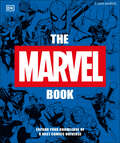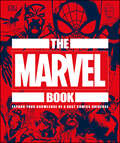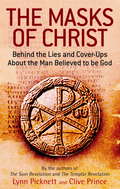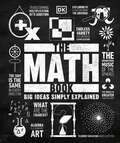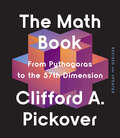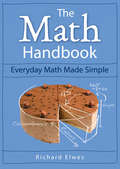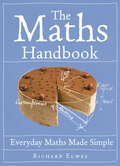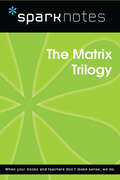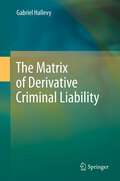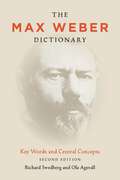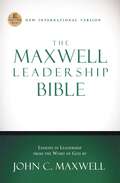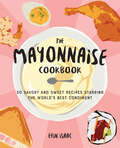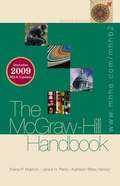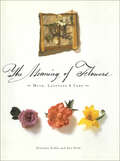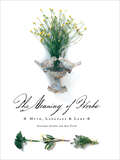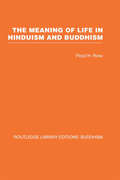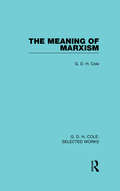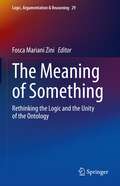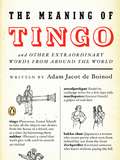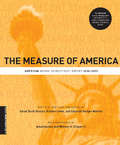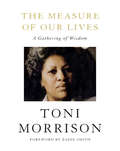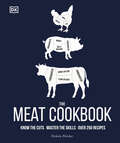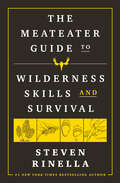- Table View
- List View
The Marvel Book New Edition: Expand Your Knowledge of the a Vast Comics Universe
by Stephen WiacekThe fully updated and expanded edition of the bestselling The Marvel Book: a comprehensive guide to the vast, interconnected Marvel Comics Multiverse.Featuring brand-new and updated character profiles alongside major Marvel Comics events, The Marvel Book: New Edition is the one reference book no fan should be without. Meticulously researched and expertly written, this expanded edition explores the amazingly diverse and exciting Marvel Comics Multiverse in staggering detail, offering everything you need to know in one beautiful package.Immerse yourself in the expansive world of Marvel Comics:Features 48 pages of new content from major Marvel Comics events, including X of Swords, Empyre, Heroes Reborn, Death of Doctor Strange, Devil's Reign, and Dark Web.Iconic illustrations and artworks from Marvel Comics artists bring each entry to life.A fresh new exploration of the franchise for Marvel fans, young and old.The Marvel Book explores the key concepts, characters, and events that have defined and shaped Marvel Comics throughout the decades. This revealing and invaluable roadmap to a boundless comics universe is one that no Marvel fan will want to miss!© 2025 MARVEL
The Marvel Book: Expand Your Knowledge Of A Vast Comics Universe
by DK Stephen WiacekThe Marvel Book is an exhilarating journey through the endlessly fascinating, ever-dynamic, and awe-inspiring Marvel Comics universe.One Marvel book to guide them all. If you want to understand the Marvel Comics Universe in all its complex glory, The Marvel Book is the only book you need. It is a unique exploration of the vast, interconnected Marvel Comics Multiverse from its birth to the end of everything and beyond. Meticulously researched and expertly written, The Marvel Book is packed with vivid, carefully sourced artwork, illuminating infographics, and incisive, specially curated essays that shed new light on the myriad wonders of the Marvel Comics universe. From iconic Super Heroes such as the Avengers, Spider-Man, and the Black Panther, to revolutionary technology like Iron Man's armors and S.H.I.E.L.D.'s Helicarriers, to enduring villains such as Thanos and Loki, The Marvel Bookexplores the key concepts, characters, and events that have defined and shaped Marvel Comics over the past 80 years. The book's content is divided into key subject areas-The Multiverse, Science and Technology, War and Peace, Cosmic Forces, Magic and the Supernatural, and Alternate Realities-that form the foundations of Marvel Comics. The Marvel Bookis a revealing and invaluable roadmap to a boundless comics universe that no Marvel fan will want to miss!© 2019 MARVEL
The Masks Of Christ: Behind the Lies and Cover-ups about the Man Believed to be God
by Lynn Picknett Clive PrinceThis book is not intended as an attack on Christianity of the Christ of faith, but is an assessment of all the historical evidence about Jesus Christ.Although there is a huge literature on the subject - theological, historical, mythical, New Age and speculative - almost all of it is aimed at a niche market. The Masks of Christ is very different, being a mainstream book aimed at everyone. For the first time, all the various theories and facts about Jesus are considered between the covers of one accessible book.As the phenomenal sales of The Da Vinci Code continue to fuel a growing global appetite for questioning the old certainities and assumptions about Christianity and what it says about its founder, never has there been a more perfect time to launch The Masks of Christ.
The Math Book (DK Big Ideas)
by DKLearn about the most important mathematical ideas, theorems, and movements in The Math Book.Part of the fascinating Big Ideas series, this book tackles tricky topics and themes in a simple and easy to follow format. Learn about Math in this overview guide to the subject, brilliant for novices looking to find out more and experts wishing to refresh their knowledge alike! The Math Book brings a fresh and vibrant take on the topic through eye-catching graphics and diagrams to immerse yourself in. This captivating book will broaden your understanding of Math, with:- More than 85 ideas and events key to the development of mathematics- Packed with facts, charts, timelines and graphs to help explain core concepts- A visual approach to big subjects with striking illustrations and graphics throughout- Easy to follow text makes topics accessible for people at any level of understandingThe Math Book is a captivating introduction to the world&’s most famous theorems, mathematicians and movements, aimed at adults with an interest in the subject and students wanting to gain more of an overview. Charting the development of math around the world from Babylon to Bletchley Park, this book explains how math help us understand everything from patterns in nature to artificial intelligence.Your Math Questions, Simply ExplainedWhat is an imaginary number? Can two parallel lines ever meet? How can math help us predict the future? This engaging overview explores answers to big questions like these and how they contribute to our understanding of math. If you thought it was difficult to learn about topics like algebra and statistics, The Math Book presents key information in an easy to follow layout. Learn about the history of math, from ancient ideas such as magic squares and the abacus to modern cryptography, fractals, and the final proof of Fermat&’s Last Theorem.The Big Ideas SeriesWith millions of copies sold worldwide, The Math Book is part of the award-winning Big Ideas series from DK. The series uses striking graphics along with engaging writing, making big topics easy to understand.
The Math Book: From Pythagoras to the 57th Dimension (Union Square & Co. Milestones)
by Clifford A. PickoverMath's infinite mysteries unfold in this updated edition of the award-winning The Math Book. Beginning millions of years ago with ancient &“ant odometers,&” and moving through time to our modern-day quest for higher dimensions, prolific polymath Clifford Pickover covers major milestones in mathematical history. Among the numerous concepts readers will encounter as they dip into this inviting anthology: cicada-generated prime numbers, magic squares, and the butterfly effect. Each topic is presented in a lavishly illustrated spread, including formulas and real-world applications of the theorems. This reissue includes four new entries: 2013 (Bounded Gaps Between Primes), 2015 (Erdős Discrepancy Problem Solved), 2016 (Sphere Packing in Dimension 8), and 2023 (Einstein Tiles and Beyond). Each topic is presented in a lavishly illustrated spread, including formulas and real-world applications of the theorems.
The Math Handbook
by Richard ElwesThis is the perfect introduction for those who have a lingering fear of math. If you think that math is difficult, confusing, dull or just plain scary, then The Math Handbook is your ideal companion. Covering all the basics including fractions, equations, primes, squares and square roots, geometry and fractals, Dr. Richard Elwes will lead you gently towards a greater understanding of this fascinating subject. Even apparently daunting concepts are explained simply, with the assistance of useful diagrams, and with a refreshing lack of jargon.So whether you're an adult or a student, whether you like Sudoku but hate doing sums, or whether you've always been daunted by numbers at work, school or in everyday life, you won't find a better way of overcoming your nervousness about numbers and learning to enjoy making the most of mathematics.
The Maths Handbook: Everyday Maths Made Simple
by Richard ElwesThis is the perfect introduction for those who have a lingering fear of maths. If you think that maths is difficult, confusing, dull or just plain scary, then The Maths Handbook is your ideal companion. Covering all the basics including fractions, equations, primes, squares and square roots, geometry and fractals, Dr Richard Elwes will lead you gently towards a greater understanding of this fascinating subject. Even apparently daunting concepts are explained simply, with the assistance of useful diagrams, and with a refreshing lack of jargon.So whether you're an adult or a student, whether you like Sudoku but hate doing sums, or whether you've always been daunted by numbers at work, school or in everyday life, you won't find a better way of overcoming your nervousness about numbers and learning to enjoy making the most of mathematics.
The Maths Handbook: Everyday Maths Made Simple
by Richard ElwesThis is the perfect introduction for those who have a lingering fear of maths. If you think that maths is difficult, confusing, dull or just plain scary, then The Maths Handbook is your ideal companion. Covering all the basics including fractions, equations, primes, squares and square roots, geometry and fractals, Dr Richard Elwes will lead you gently towards a greater understanding of this fascinating subject. Even apparently daunting concepts are explained simply, with the assistance of useful diagrams, and with a refreshing lack of jargon.So whether you're an adult or a student, whether you like Sudoku but hate doing sums, or whether you've always been daunted by numbers at work, school or in everyday life, you won't find a better way of overcoming your nervousness about numbers and learning to enjoy making the most of mathematics.
The Matrix Trilogy (SparkNotes Film Guide)
by SparkNotesThe Matrix Trilogy (SparkNotes Film Guide) Making the reading experience fun! SparkNotes Film Guides are one-stop guides to great works of film–masterpieces that are the foundations of filmmaking and film studies. Inside each guide you&’ll find thorough, insightful overviews of films from a variety of genres, styles, and time periods. Each film guide contains:Information about the director and the context in which the film was made Thoughtful analysis of major characters Details about themes, motifs, and symbols Explanations of the most important lines of dialogue In-depth discussions about what makes a film so remarkable SparkNotes Film Guides are an invaluable resource for students or anyone who wants to gain a deeper understanding of the great films they know and love.
The Matrix of Derivative Criminal Liability
by Gabriel HallevyDerivative criminal liability includes inchoate offenses (criminal attempt, conspiracy, preparatory offenses, etc.), complicity (joint perpetration, perpetration through another, incitement, solicitation, accessoryship, etc.), organized crime, natural and probable consequences liability, post-crime aid, enterprise liability, terrorism and terrorist infrastructure, and many more forms of criminal liability, clearly making it a major pillar of modern criminal law. Although derivative criminal liability affects countries worldwide, there is still no general legal theory that covers this issue. The objective of the present book is to develop a comprehensive, general, legally sophisticated, and at the same time practical theory of derivative criminal liability. The book emphasizes the practicality of the theory to enable courts, lawyers, legislators, attorneys, students, and academics to apply it in their daily professional occupations.
The Max Weber Dictionary: Key Words and Central Concepts, Second Edition
by Richard Swedberg Ola AgevallMax Weber is one of the world's most important social scientists, but he is also one of the most notoriously difficult to understand. This revised, updated, and expanded edition of The Max Weber Dictionary reflects up-to-the-moment threads of inquiry and introduces the most recent translations and references. Additionally, the authors include new entries designed to help researchers use Weber's ideas in their own work; they illuminate how Weber himself thought theorizing should occur and how he went about constructing a theory. More than an elementary dictionary, however, this work makes a contribution to the general culture and legacy of Weber's work. In addition to entries on broad topics like religion, law, and the West, the completed German definitive edition of Weber's work (Max Weber Gesamtausgabe) necessitated a wealth of new entries and added information on topics like pragmatism and race and racism. Every entry in the dictionary delves into Weber scholarship and acts as a point of departure for discussion and research. As such, this book will be an invaluable resource to general readers, students, and scholars alike.
The Maxwell Leadership Bible, NIV: Holy Bible, New International Version
by John C. MaxwellThe Leadership expert, John Maxwell, provides an in-depth look at God's laws for leaders and leadership, directly connected to the Bible. Now for the first time, the content of The Maxwell Leadership Bible is paired with the bestselling New International Version.Features include:Complete NIV Bible text and translators' notesBook introductionsArticles describing the 21 Laws of Leadership and the 21 Qualities of a LeaderNotes throughout the Bible that connect with the Laws and QualitiesIndexes to the 21 Laws of Leadership and the 21 Qualities of a LeaderPart of the Signature Series line of Thomas Nelson BiblesMaxwell Leadership Bibles sold to date: More than 675,000
The Mayonnaise Cookbook: 50 Savory and Sweet Recipes Starring the World's Best Condiment
by Erin IsaacA cookbook with recipes for everything from main courses to sides, sauces, and sweets, all using one of America&’s favorite condiments—includes photos. Celebrate the greatest condiment of all time with the best mayo-based recipes, including comfort food classics like potato salad and deviled eggs as well as saucy cooking hacks for chocolate cupcakes and grilled cheese. Mayonnaise, lovingly referred to as mayo, is one of the most versatile yet divisive condiments. Some slather it on anything they can find, while others avoid eating it at all costs. Whether you love it or hate it, this cookbook is sure to turn any mayo skeptic into a believer and have every mayo enthusiast jumping for joy! The Mayonnaise Cookbook highlights mayo in its entirety, with instructions on how to make your own mayonnaise, pros and cons of the many mayo brands out there, and 50 delicious, easy-to-follow recipes that feature mayonnaise as the star. Ranging from appetizers, side dishes, salad dressing, desserts, and more, you&’ll get a taste for just how delicious mayonnaise can be, with tasty recipes like: Lobster Rolls Elote Street Corn Spinach Artichoke Dip Chicken Tenders Creamy Avocado Dressing Chocolate Mayo Cupcakes And more! The ultimate guide to cooking with mayonnaise, The Mayonnaise Cookbook is sure to turn you and your friends and family into major mayo connoisseurs!
The McGraw-Hill Handbook (Second Edition)
by Elaine Maimon Janice Peritz Kathleen YanceySpecific, student- and instructor-tested features of The McGraw-Hill Handbook equip today's students with tools for learning, writing, researching, and editing. The book also provides students and teachers with access to powerful online resources.
The Meaning of Flowers: Myth, Language & Lore
by Ann Field Gretchen ScobleA colorful primer to the symbolism and lore from around the world for over sixty flowers to help you add meaning to any floral gift.Should you send a rose of crimson or of white to the one you love? What gift of flowers best expresses thanks to a dear friend? From ancient days, long before words complicated what we say to one another, flowers have been our messengers, invested with our most cherished feelings.Illustrated with luscious collages by acclaimed artist Ann Field, this enchanting tribute to the power and symbolism of flowers offers a contemporary introduction to an age-old tradition. The text draws on botanical, historical, and mythological sources worldwide, from ancient Rome to Victorian England, from Asia to the Americas, presenting portraits of over sixty blossoms favored for all time. In Persia, for instance, the black medulla of the red tulip was said to represent the lover’s heart, burnt to a coal by love’s passion. To Victorians, lavender signified a broken trust, hollyhocks fertility, and nasturtiums a jest or whimsy.Blending fact, folktale, natural history, and original art, The Meaning of Flowers explores the language and lore of nature’s most intimate and beautiful gifts.
The Meaning of Herbs: Myth, Language & Lore
by Ann Field Gretchen ScobleThe fascinating history and uses of these versatile botanicals through the ages, from love potions to self-care—from the authors of The Meaning of Flowers. &“Take borage for courage. Send a bouquet of yarrow to declare war. Hang a sprig of rue at the door to keep witches at bay.&” Like flowers, herbs are steeped in myth and magic, secrets and lore. For centuries, their powers have been called upon to seduce lovers and dispel witches, send hidden messages and brew potent elixirs, entice the palate and soothe the mind. Illustrated with enchanting collages by acclaimed artist Ann Field, this delightful tribute to the meaning and magic of herbs offers a contemporary introduction to an age-old tradition. The text draws on botanical, mythological, and historical sources worldwide, from ancient Rome to Victorian England, from Asia to the Americas, presenting profiles of over fifty herbs favored through the ages. Blending fact, folktale, natural history, and original art, The Meaning of Herbs explores the language and lore of nature&’s most versatile and powerful gifts.
The Meaning of Life in Hinduism and Buddhism (Routledge Library Editions: Buddhism)
by Floyd H RossOriginally published in 1952. This volume, by discussing significant insights of Hinduism and Buddhism, answers the question "What is the meaning of life?" It illustrates the importance of Buddhist and Hindu teachings and their relevance to the West, as well as clarifying some of the religious and philosophical problems Western readers must grapple with.
The Meaning of Marxism (Routledge Library Editions)
by G. D. ColeThis book is largely based on What Marx Really Meant which was written by Cole and published in 1934. It is a revaluation of Marx's essential ideas and methods in relation to contemporary social structures and developments and considers the bearing of Marx's theories on the structure of social classes, which altered greatly since he formulated his account of them.
The Meaning of Something: Rethinking the Logic and the Unity of the Ontology (Logic, Argumentation & Reasoning #29)
by Fosca Mariani ZiniThis innovative volume investigates the meaning of ‘something’ in different recent philosophical traditions in order to rethink the logic and the unity of ontology, without forgetting to compare these views to earlier significative accounts in the history of philosophy. In fact, the revival of interest in “something” in the 19th and 20th centuries as well as in contemporary philosophy can easily be accounted for: it affords the possibility for asking the question: what is there? without engaging in predefined speculative assumptions The issue about “something” seems to avoid any naive approach to the question about what there is, so that it is treated in two main contemporary philosophical trends: “material ontology”, which aims at taking “inventory” of what there is, of everything that is; and “formal ontology”, which analyses the structural features of all there is, whatever it is. The volume advances cutting-edge debates on what is the first et the most general item in ontology, that is to say “something”, because the relevant features of the conceptual core of something are: non-nothingness, otherness. Something means that one being is different from others. The relationality belongs to something.: Therefore, the volume advances cutting-edge debates in phenomenology, analytic philosophy, formal and material ontology, traditional metaphysics.
The Meaning of Tingo
by Adam Jacot de BoinodDid you know that people in Indonesia have a word that means 'to take off your clothes in order to dance'? Or how many words the Albanians have for eyebrows and moustaches? Or that the Dutch word for skimming stones is plimpplamppletteren? Drawing on the collective wisdom of over 154 languages, this intriguing book is arranged by theme so you can compare attitudes all over the world to such subjects as food, the human body and the battle of the sexes. Here you can find not only those words for which there is no direct counterpart in English (such as the Japanese age-otori which means looking less attractive after a haircut), but also a frank discussion of exactly how many 'Eskimo' terms there are for snow, and a vast array of information exploring the wonderful and often downright strange world of words. Oh, and tingo means 'to take all the objects one desires from the house of a friend, one at a time, by asking to borrow them'.
The Measure of America: American Human Development Report, 2008-2009 (A Columbia / SSRC Book)
by Burd-Sharps SarahThe Measure of Americais the first-ever human development report for a wealthy, developed nation. It introduces the American Human Development Index, which provides a single measure of well-being for all Americans, disaggregated by state and congressional district, as well as by gender, race, and ethnicity. The Index rankings of the 50 states and 436 congressional districts reveal huge disparities in the health, education, and living standards of different groups. Clear, precise, objective, and authoritative, this report will become the basis for all serious discussions concerning the realization of a fair, just, and globally competitive American society.
The Measure of America: American Human Development Report, 2008-2009 (A Columbia / SSRC Book)
by Kristen Lewis Sarah Burd-Sharps Eduardo MartinsThe Measure of America is the first-ever human development report for a wealthy, developed nation. It introduces the American Human Development Index, which provides a single measure of well-being for all Americans, disaggregated by state and congressional district, as well as by gender, race, and ethnicity. The Index rankings of the 50 states and 436 congressional districts reveal huge disparities in the health, education, and living standards of different groups. Clear, precise, objective, and authoritative, this report will become the basis for all serious discussions concerning the realization of a fair, just, and globally competitive American society.
The Measure of Our Lives: A Gathering of Wisdom
by Toni MorrisonAt once the ideal introduction to Toni Morrison and a lovely and moving keepsake for her devoted readers: a treasury of quotations from her work. With a foreword by Zadie Smith."She was our conscience. Our seer. Our truthteller." --Oprah WinfreyThis inspirational book juxtaposes quotations, one to a page, drawn from Toni Morrison's entire body of work, both fiction and nonfiction--from The Bluest Eye to God Help the Child, from Playing in the Dark to The Source of Self-Regard--to tell a story of self-actualization. It aims to evoke the totality of Toni Morrison's literary vision. Its compelling sequence of flashes of revelation--stunning for their linguistic originality, keenness of psychological observation, and philosophical profundity--addresses issues of abiding interest in Morrison's work: the reach of language for the ineffable; transcendence through imagination; the self and its discontents; the vicissitudes of love; the whirligig of memory; the singular power of women; the original American sin of slavery; the bankruptcy of racial oppression; the complex humanity and art of black people. The Measure of Our Lives brims with elegance of style and mind and moral authority.
The Meat Cookbook: Know the Cuts, Master the Skills, over 250 Recipes
by Nichola FletcherA meat feast awaits! Become an expert on buying, preparing and cooking meat.From discovering why cuts matter to learning how to recognize top-quality meat, this is your one-stop, practical guide. It contains everything you&’ve ever wanted to know about meat.Inside the pages of this meat recipe book, you&’ll find: • A comprehensive course in preparing and cooking meat with over 250 recipes. • Recipes feature timing and temperature charts to help you create the perfect flavor, plus help you choose which herbs go with different dishes. • A unique &“How to Butcher&” section provides illustrated step-by-steps and focuses on cuts of meat that can be easily butchered at home. • Expert advice from butchers on the best cooking techniques, as well as tips on how to use a meat thermometer, how to test for &“doneness&” and how to experiment with flavor pairings. Whether you want to learn how to slow-cook for maximum flavor or create the perfect Sunday roast, this cookbook has all the answers for meat lovers eager to try working with different meats and cuts. Get the best from your meat with step-by-step preparation and cooking techniques, and learn key home butchery skills, like needling, frenching, rolling and tying.Find out everything there is to know about well-raised meat — where to buy it and why it tastes better. Cook more than 250 of the world's best poultry, pork, beef, lamb and game dishes like Jamaican Jerk Chicken, Portuguese Pork with Clams, Kerala Beef and Barbecued Moroccan Lamb. With The Meat Cookbook, you&’ll become a connoisseur in no time!
The MeatEater Guide to Wilderness Skills and Survival
by Steven RinellaAn indispensable guide to surviving everything from an extended wilderness exploration to a day-long boat trip, with hard-earned advice from the host of the show MeatEater as seen on NetflixFor anyone planning to spend time outside, The MeatEater Guide to Wilderness Skills and Survival is the perfect antidote to the sensationalism of the modern survival genre. Informed by the real-life experiences of renowned outdoorsman Steven Rinella, its pages are packed with tried-and-true tips, techniques, and gear recommendations. Among other skills, readers will learn about old-school navigation and essential satellite tools, how to build a basic first-aid kit and apply tourniquets, and how to effectively purify water using everything from ancient methods to cutting-edge technologies. This essential guide delivers hard-won insights and know-how garnered from Rinella&’s own experiences and mistakes and from his trusted crew of expert hunters, anglers, emergency-room doctors, climbers, paddlers, and wilderness guides—with the goal of making any reader feel comfortable and competent while out in the wild.
